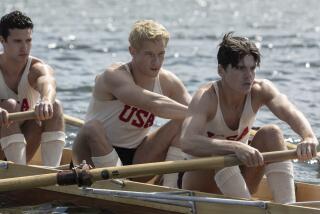TV review: ‘Jesse Owens’ on fast-forward
- Share via
The Olympics are (almost) back, and it’s a good time to sing again the ballad of Jesse Owens, the black American track star who put the lie to Adolf Hitler’s master-race malarkey at the 1936 Summer Olympics by winning four gold medals. (It’s never not a good time to sing that song, of course.) “Jesse Owens,” premiering Tuesday on PBS SoCal as part of the series “American Experience,” is the latest work to take up that inspiring tune.
Written by Stanley Nelson, directed by Laurens Grant (“Freedom Riders”) and narrated by Andre Braugher, whose voice is always pleasing to hear, the hour-long film is necessarily a streamlined, simplified version of the life. Concentrating on Owens’ Olympic adventure, with testimony from family, friends, teammates, spectators and scholars, it provides enough background and aftermath to give the story shape and movement, even as it suggests questions for further films to answer.
Owens, who once recalled the feeling that running could take you anywhere “on the strength of your feet and the courage of your lungs,” was only one of 18 African American Olympians who traveled to Berlin in 1936, but he was already a star attraction. The year before at the Big Ten Conference Championships in Ann Arbor, Mich., in what is still regarded as one of the great days in sports history, he set three world records (including a long jump mark that stood for 25 years) and tied a fourth in the space of 45 minutes, all with an injured back.
His Olympic victories in the 100 meters, the 200, the long jump and the 400 relay (in which he and teammate Ralph Metcalfe were sudden substitutions for two Jewish runners) make him a kind of war hero, retrospectively. But if Hitler was less than pleased, the largely German crowd chanted his name and Luz Long, the German whom Owens beat in the long jump, took his arm to walk the stadium.
But Owens’ decision to leave a grueling post-Olympics exhibition tour set him against autocratic U.S. Olympic Committee President Avery Brundage, who stripped him of his amateur standing, summarily ending his athletic career. His future races would be for show, against racehorses and the like. “It’s just like saving somebody’s life,” offers Owens’ Olympic teammate Louis Zamperini, “and then the next day that person slaps you in the face.”
If there’s a fault to this invigorating film, it’s that it gives a clearer picture of the phenomenon than of the person; apart from the running and jumping, Owens comes across less as an actor in his life than as someone acted upon.
And as if the filmmakers’ interest waxes and wanes with the nation’s, his last 40 years are compressed almost into a coda, a familiar arc of hard times, including bankruptcy and tax problems, and eventual recognition and reward, as he becomes an international ambassador of goodwill and what one writer called a “professional good example.”
More to Read
The biggest entertainment stories
Get our big stories about Hollywood, film, television, music, arts, culture and more right in your inbox as soon as they publish.
You may occasionally receive promotional content from the Los Angeles Times.











